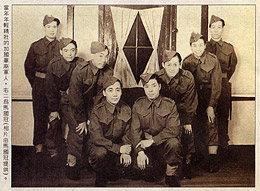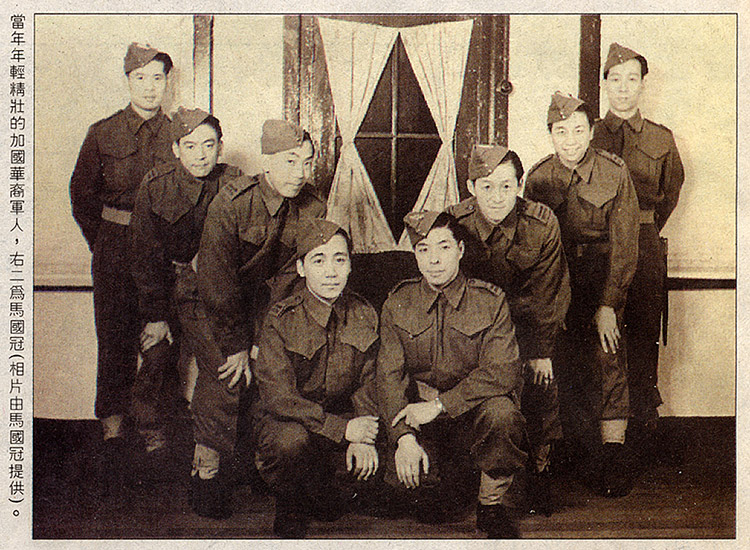Roy Chan
Roy Chan is one of four brothers - Herby, Ira, Paul and Roy - who served in the Second World War. « View Transcript
Wesley Lowe (Interviewer)
Sergeant Roy Chan, one of four Chan brothers from Victoria to serve in the Second World War, volunteered to be part of Special Operations Executive's Operation Oblivion. Dropped behind enemy lines into Japanese held territory, he operated with the 9th Australian Division at Lebuan Borneo. There, he organized and led native guerillas and Iban Headhunters. Challenges in working with these locals included language and their lack of training.
Roy Chan (Interviewee)
A bunch of local Chinese boy in Borneo, take them on patrol. Never realize it until, in Borneo, I never had the chance to learn Malay. We got to learn Malay to speak with the native but I have a Chinese boy. He speak Chinese, Cantonese, Mandarin, Malayan and English so I depend on him all the time. So one day they say, "Sign him up as a soldier instead of as an interpreter. Give him a 38 pistol." So the sergeant said, "Take him into the bush and let him have the feeling of a 38 pistol." So I let him fire his pistol. I fire my 45 and I was lucky I hit the can. They think I was pretty good and the rest of the boys was crying. They want to fire a few round from their rifle. So I said alright. I give them permission to fire three round. Afterward, they told me that's the first time they fire a rifle. And I took them on patrol three, four times, but of course there's a couple of machine guns, bren guns. Whenever I stop, I make sure those machine gun right beside me. I don't want them shoot behind me. So those are the things you never realize. They train you how to clean a rifle, how to slope arm, present arm. They never teach them how to fire rifle.
Wesley
This Australian mission had little chance for success - something that was drilled into Roy.
Roy
Major Kendall mentioned many times for us to prepare to commit suicide. That's to me I don't like that phrase but I was there behind the line. I got one thing I promise myself - not to be taken alive. I gonna [sic] shoot myself first, because if I captured alive, I know I die a thousand deaths. So I put myself out of misery by having two extra round bullets in one pocket for myself, but good thing I don't have to use it.
Wesley
Added to the danger of the complexity and scope of the mission was an inadequate amount of time and manpower.
Roy
Well, there were so many briefing. The way they were briefing at Labuan - that's the headquarter that they got a job for us to do to from where we drop we go four hundred mile overland to organize a guerilla army to free 2,000 European in a city called Kooching. Now, headquarters say allow us six month. I say to myself, "How can they allow six months to do a job that to recruit enough men to break into that compound?" But by the time we get there they change their mind because in one town north of where we were, the Japanese heard that there's movement of prisoner. They killed so many see. They don't have to have a repeat at Kooching so we were stuck in there in that small operation.
Wesley
Roy and his group succeeded in blocking the mighty Rejang River to the enemy, forcing them back out on the headquarters near the coast controlling the river traffic. His patrols also successfully attacked the enemy inflicting heavy casualties. Although Roy and his group were heroes, it was something that they could not advertise, even to their families.
Roy
When I get back to Australia after the war, first thing went to the headquarters in Melbourne and they call the four of us sergeants in there. They said, "Your job is finished as far as the Australian army." He said, "You forget where you've been." So when we went back home, we never tell them where we've been. My mother and brother they thought all the time I'm in Australia, training all the time and coming home after the war 'til the newspaper put that thing tell everyone where we been. I guess it's sort of protection for not mention. This should be a secret act for five years after the war before they mention what we done.
Did you Know?
Did you that Roy Chan was a cook in the army even though he couldn't cook?
Table of Contents
- John Ko Bong member of Operation Oblivion
- Mary Ko Bong an instrument mechanic
- Neill Chan deciphered communications
- Paul Chan served in the Second World War
- Roy Chan served in the Second World War
- Bill Chong served as Agent 50...
- George Chow trained as a gunner
- Marshall Chow a wireless operator
- Douglas Jung represented CA at UN
- Daniel Lee an aircraft mechanic
- Peggy Lee served in the home front
- Alex Louie trained in India to parachute
- Albert Mah flew 420 return trips from...
- Cedric Mah a pioneering bush pilot
- Roy Mah a pillar of the community
- Gordie Quan full military career
- Andrew Wong in US Merchant Marines
- Frank Wong in Holland for the liberation
- Henry Albert (Hank) Wong
- Larry Wong in Newfoundland Regiment
- Mary Laura Wong (Mah) a teletype operator
- Date modified:

